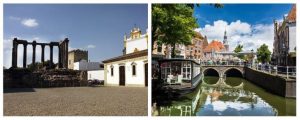Project POCITYF onderneemt actie in de transformatie naar energiepositieve steden (bericht in Engels)
A new smart city EU-funded project, POCITYF, is set to transform our historical and cultural cities into more efficient, healthy, sustainable living environments with “positive energy districts”. The project kicks off on 9 October in Évora, Portugal. New Energy Coalition is one of the 46 partners from 13 countries.
At the heart of this new project lie “Positive Energy Blocks/Districts”, which are groups of buildings that actively manage their energy consumption and the energy flow between them and the wider energy system. Positive energy districts have an annual positive energy balance.
POCITYF (A Positive Energy CITY Transformation Framework) will combine these positive energy blocks with grid flexibility, e-mobility, innovative ICT technologies and citizen engagement strategies. The overall aim is to help cities deliver positive energy districts while respecting their mixed urban settings that often include listed buildings of historical interest and other cultural heritage features.
Focus on heritage areas
Project coordinator João Maciel, from EDP LABELEC, explains: “POCITYF is different because it includes a strong focus on heritage areas, tackling the untapped barriers that accrue from legal and regulatory restrictions against the installation of conventional solutions that historical and protected sites currently struggle with. It is a project from which many other historical cities can draw inspiration from.”
Two lighthouse cities: Évora and Alkmaar
Activities will be carried out in two lead cities or “Lighthouse” cities: Évora (Portugal) and Alkmaar (Netherlands). Six other cities, known as fellow cities, will seek to replicate the works: Granada (Spain), Bari (Italy), Celje (Slovenia), Ujpest (Hungary), Ioannina (Greece) and Hvidovre (Denmark). Beyond this project group, other cities are invited to join the POCITYF network to share experience and learn from the project’s findings.
The two Lighthouse cities will benefit from solutions divided into four “Energy Transition Tracks”:
- Innovative solutions for positive buildings and districts
- Peer to peer energy management and storage solutions for grid flexibility
- e-mobility integration into smart grid and city planning
- Citizen-driven innovation in co-creating smart city solutions
Overall, POCITYF will therefore add layers of “smartness” to key city infrastructures, technologies and services, creating new possibilities to make cities safer, greener and more responsive to the needs of their citizens, businesses and other organisations.
Mr. Peter van den Dries, program manager of Alkmaar Municipality: “Alkmaar isn’t just a city with a strong cultural and historical heritage; it is also an enterprising, modern city with a strong knowledge-driven economy, based on sustainability, tourism, healthcare, entrepreneurship and innovation. The cooperation between partners both in Europe as well as locally in The Netherlands will push the innovation on positive energy applications forward.”
Within this project, a consortium will demonstrate aspects of a smart and energy positive city in Alkmaar and Evora. This will include high performance insulation, generation of energy using innovative solar panels, the development of micro-grids and smart grids, the application of smart heating etc. Based on the demonstration results, New Energy Coalition and partners will develop replicable approaches and financing models to make these Smart Cities a reality all over Europe. We will also try to implement lessons learned from the Making City project in Groningen to maximize our impact.
- Mark de la Vieter of New Energy Coalition | partner in POCITYF

